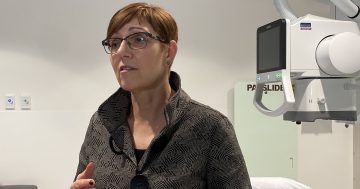
Whenever we ask women for areas of health that they wish they had more information about, the subject of menopause comes up. Women want to know what to expect, what’s normal and when you should see your doctor, and ways to manage symptoms. But finding reliable information was not easy in Canberra – until Sexual Health and Family Planning ACT opened the Canberra Menopause Centre.
Established in 2005 by Dr Linda Welberry, The Canberra Menopause Centre has 5 doctors, with a special interest in women’s health at midlife, who do sessional work at the clinic on University Avenue in the city. Being in the city makes it easier for women from all over Canberra to find the Centre, with appointments available Tuesday to Friday during normal office hours. The doctors at the Canberra Menopause Centre understand that it takes time to listen and give appropriate advice.
In Australia, the average age for menopause is 52 years. But there is a wide range of normal – anything from 45 to 55 years. Some women will experience menopause at a younger age, such as following surgery to remove ovaries, radiotherapy, or chemotherapy. Effects of menopause can include insomnia, night sweats, hot flushes, mood changes, sexual difficulties such as feeling uncomfortable or lower sex drive, tiredness, urinary problems, and changes to menstrual cycle before periods stop altogether.
Initial appointments usually take around 45 minutes, and follow-up appointments are usually 30 minutes. For women who have a concession card, the initial appointment is $130, and they should get $105 back from Medicare. For women without a concession card, the initial cost will be $210 ($105 Medicare rebate). The first appointment includes Membership at Sexual Health and Family Planning ACT. Membership allows subsequent appointments at reduced rate.
The doctors at the Centre see women from early perimenopause (the lead-up to menopause, where some symptoms begin to appear) right through to post menopause. For women in perimenopause, common concerns are about how to manage symptoms. These might include changes to their menstrual cycle, mood changes, bladder frequency, or just feeling like something is changing. Blood tests are not a reliable indicator of how long it will be before a woman reaches menopause. Perimenopause may last a number of years, so it’s a good idea to get advice about managing the symptoms.
The doctors at the Centre provide advice on what to expect, prescribe treatment if needed, and take the opportunity to talk about improving general well-being including bone and cardiovascular health. As oestrogen levels drop, women may experience problems with weight gain, and a woman’s risk of cardiovascular disease increases. The good news is that with some adjustments to diet and exercise, women can maintain good heart health as well as protecting against osteoporosis and improving their psychological wellbeing. It’s also important to consider contraception until at least a year after the last period, or two years for women who are under 50 years old. For women who are on hormone replacement therapy, it is important to talk with a doctor about effective contraception until it is no longer required.
For women who have already reached menopause, often the concerns relate to effects on their quality of life. Some women are well over 60 years old before they call the Centre for a first appointment, because they were hoping their symptoms would settle over time. Dr Rosa from the Canberra Menopause Centre says she is amazed at what some older women have been putting up with, and it’s important for them to know that they can talk to a doctor about ways to improve their quality of life.
One topic that many women worry about is hormone replacement therapy (HRT). Studies in the early 2000s suggested that it increased risks for some forms of cancer, and heart disease. But the current international consensus of medical opinion is that menopause hormone therapy is safe and effective for most women, provided it is commenced around the same time as menopause. The studies that had generated the concerns were on a group of women with an average age of 64 (well past menopause) commencing HRT, but most women commence HRT around 50 years old. Ten years post menopause, the woman’s body may have already adjusted to the change in hormone levels, so to suddenly introduce higher levels of hormones through HRT at that time may have unexpected and unwanted side effects. The benefits of HRT are greater for women close to the natural age of menopause than for older women.
An important part of what the doctors do during these conversations is listen to the concerns women have about menopause. Some women don’t feel comfortable talking about sensitive topics such as being sexually active, urinary issues, or their moods with their usual doctor. Where necessary, the Canberra Menopause Centre will refer to specialists. They can provide a report back to the woman’s usual doctor for file if treatment is recommended, and the woman consents to having the information given to her doctor.
Women who want to find out more can call the Canberra Menopause Centre for an appointment on 02 6247 3077, or can request a referral from their GP.




















